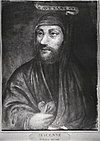| Author | Avicenna |
|---|---|
| Original title | كتاب الشفاء |
| Language | Arabic |
| Genre | Natural Philosophy |
| Published | 1027 (Arabic) |
 |
| Part of a series on |
| Avicenna (Ibn Sīnā) |
|---|
| Works |
| Thoughts |
| Pupils |
| Monuments |
The Book of Healing (Arabic: کتاب الشفاء, romanized: Kitāb al-Shifāʾ; Latin: Sufficientia; also known as The Cure or Assepha) is a scientific and philosophical encyclopedia written by Abu Ali ibn Sīna (also known as Avicenna) from medieval Persia, near Bukhara in Maverounnahr. He most likely began to compose the book in 1014, completed it around 1020,[1] and published it in 1027.[2][3]
This work is Ibn Sina's major work on science and philosophy, and is intended to "cure" or "heal" ignorance of the soul. Thus, despite its title, it is not concerned with medicine, in contrast to Avicenna's earlier The Canon of Medicine (5 vols.) which is, in fact, medical.
The book is divided into four parts: logic, natural sciences, mathematics (a quadrivium of arithmetic, geometry, astronomy), and metaphysics.[3] It was influenced by ancient Greek philosophers such as Aristotle; Hellenistic thinkers such as Ptolemy; and earlier Persian/Muslim scientists and philosophers, such as Al-Kindi (Alkindus), Al-Farabi (Alfarabi), and Al-Bīrūnī.
- ^ "Ibn Sina Abu 'Ali Al-Husayn". Muslimphilosophy.com. Retrieved 2014-08-05.
- ^ Cite error: The named reference
Goodmanwas invoked but never defined (see the help page). - ^ a b Goodman, Lenn Evan. 1992. Avicenna. Routledge. ISBN 0-415-01929-X. p. 31.